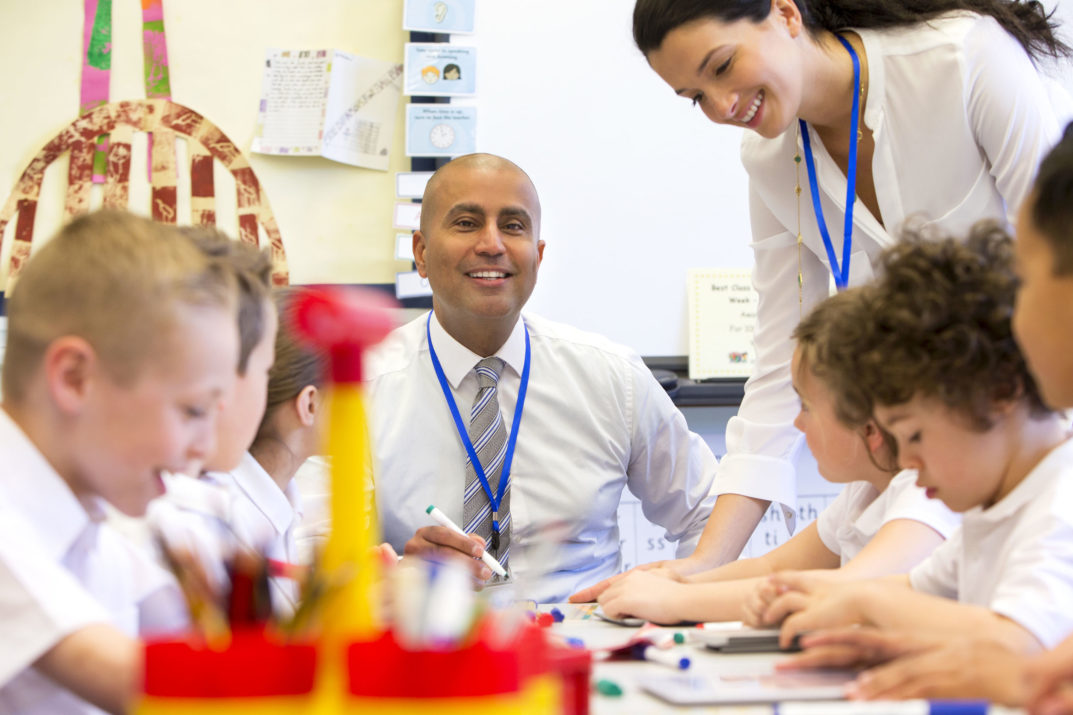
From classroom management skills to subject-specific instructional methods, there are a wealth of areas where teachers can expand their knowledge and skill sets. The question is how to find and pursue professional development opportunities that support your own specific goals.
If you want to become an even educator with a new or updated skill set as part of your teaching arsenal, follow these expert tips.
Getting Started in Career Development
High quality teaching has been shown to be the single most important factor for boosting student success. Even small changes to teaching style and skills can pay off in terms of student learning, according to leadership coach Gregory Leap. That’s why it’s so important to train current and future teachers on how to implement key teaching techniques.
To expand your skills as an educator, you need to know the fields in which you can most improve. Teach n’ Kids Learn, an education and professional development services company, outlines a list of essential teacher development areas, which include classroom management and instructional methods. Technology use, state and local curriculum, parental interaction and advancement courses (for becoming an administrator) are also included on this list.
Teacher collaboration is another core part of expanding your skill set. In an article by EDC professional development specialist Mary Burns and Save the Children head of education James Lawrie, it is suggested that collaborating with colleagues can lead to increased teacher effectiveness, improved student test-score gains and a stronger willingness to innovate.
Classroom Management
Classroom management is an area that can always be improved, especially as new research points to fresh pedagogies and strategies. Eaglebrook School in Deerfield, Massachusetts says the ability to anticipate upcoming events, balance preparation and lesson planning demands and support student organization are all key to a successful classroom.
For that reason, planning and organization skills are an aspect of classroom management that can always be honed and sharpened. This is especially true for teachers who might want to expand to teaching other grades and subjects, as these might require different demands in terms of management.
Education software solutions provider Edsys adds that kindness and compassion can go a long way towards improving classroom management. Engaging in skill development courses related to student learning environments, communication and cultural sensitivity can help teachers forge stronger bonds with students. In turn, this can help students feel safer and more at ease, which can improve learning outcomes.
Teachers might also consider engaging in ongoing psychological development courses that can assist in their empathy skills. The team at Noplag, an online plagiarism checker, points out that all teachers need a base level of psychological methodology in order to cope with the demands of the profession. Becoming well-versed in this area can set you as an example to your peers and make you even more respected by both students and colleagues.

Technology Use
Classroom technology is a core area that many teachers can benefit from exploring. Their students will benefit too as increased technology use can improve student learning outcomes and preparedness for life outside school. Jane Ashworth, managing director at SMART Technologies, says that educators who apply proven teachings strategies frequently are more likely to be successful at teaching technology.
Lucie Renard at BookWidgets writes that staying current with technology can help teachers protect students from harmful threats online. Being unaware of social media uses can make it difficult for students to open up about things such as cyber bullying, for example. When you can clearly show that you’re in the know, students will feel more comfortable approaching you with such situations.
Teacher Collaboration
Teachers who leverage collaborative techniques are proven to support a more positive learning environment. Teamwork is an important area of skill development for teachers, Joanna Zambas at Career Addict writes. Being able to network with other teachers promotes the sharing of strategies and problem solving, which can improve the overall learning climate of a school and its district.
Educator Lee Watanabe-Crockett agrees that teamwork among teachers is crucial. He also brings up the point that teachers who model teamwork effectively can show students what it means to work in groups, which includes compromise and practicing kindness. When students see what collaboration looks like, they’ll be more likely to employ such strategies in their own group work.
Teacher collaboration can also be pursued at retreats, conferences and other events for educators. In a unique and creative event hosted by Ikon Gallery, for example, teachers were invited to engage with other teachers and educators around practical, hands-on activities. These activities include art making and clay molding, and the skills learned during this event were designed to translate into everyday classroom life.
For longer getaways, teachers might consider retreats such those offered by Wake Up Schools. The nonprofit organization invites teachers to attend mindfulness retreats where they can practice stress management, learn relaxation and mental coping skills with other like-minded teachers. These skills are greatly beneficial for a teacher’s personal growth, and can also promote a more positive and peaceful classroom environment.

Advancement Courses
Once you’ve identified the area or areas you’d like to focus on, it’s important to weigh your options for learning. Many teachers turn to online courses for teacher development — especially if they’re seeking to advance in a specific area.
OpenLearn
OpenLearn is a website that offers a wealth of teacher development courses free of charge. From improving your mentorship and leadership skills to becoming more skilled in catering to English as a foreign language students, these skills offer everything a modern teacher might need to develop their professional skills.
Teacher Skills Forum
For a shorter, more intense focus on skill set development, a conference or teachers’ summit could be a great learning opportunity. For example, the Teacher Skills Forum provides teachers from the Arab world with creativity, innovation, and modern thinking skills they need to succeed in today’s classrooms.
This forum is an annual event that has been inspiring and motivating teachers since 2014. It focuses on helping students reflect on individual growth and internalize learning while promoting curiosity, problem solving, decision making and reflective practices across disciplines.
Humanutopia
Another idea is to attend a teacher training course in-person as a group with other teachers. Humanutopia provides teacher training courses focused on teacher self-development and skill building. Through inspiring and motivating courses, Humanutopia helps teachers understand more about the character and needs of young people — and how teachers can cater to those circumstances. Teachers interested in such skill set development might consider asking school administrators for funding or support.
Images by: dglimages/©123RF Stock Photo, Nicole DeKhors, Matthew Henry


What do you think?